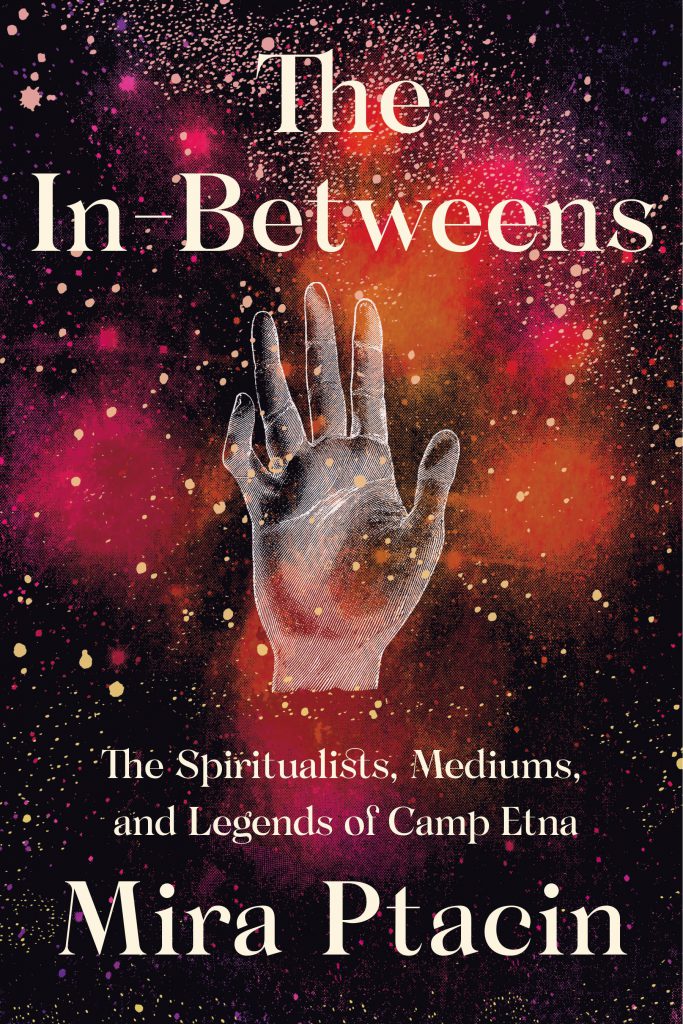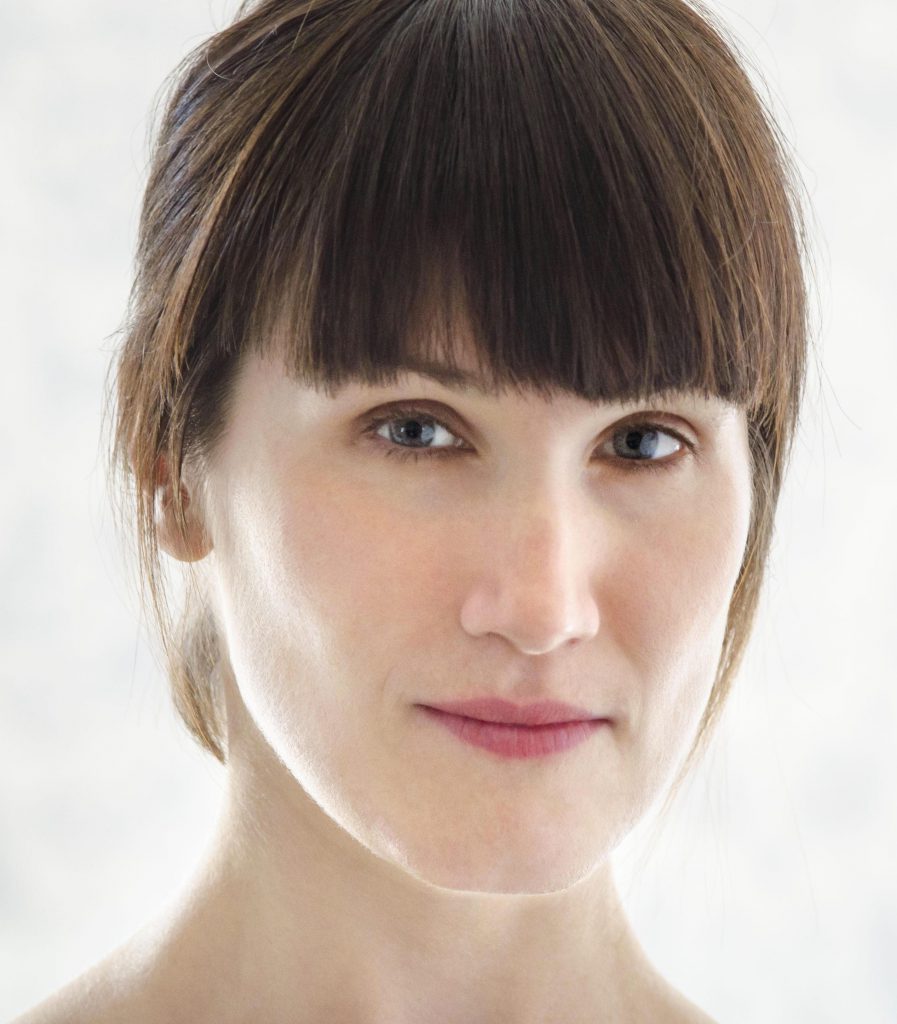The author of the acclaimed memoir Poor Your Soul (Soho Press 2016) and The In-Betweens: The Spiritualists, Mediums, and Legends of Camp Etna (Liveright 2019), Mira Ptacin has written for NPR, Guernica, New York, Tin House, and Vice, among other publications. She teaches memoir-writing to women at the Maine Correctional Center and lives on Peaks Island, Maine.
NEW ORLEANS REVIEW
What was your knowledge of Spiritualism before writing this book? How did you discover Camp Etna? What prompted you to tell this story?
MIRA PTACIN
It wasn’t until a friend of mine suggested that I check out this interesting community of spiritual women a couple hours north of my home in Maine that I actually learned what Spiritualism was. I put off looking into it for at least a year or two, and then when I finally began looking into camp, before I headed up to Camp Etna, I googled the word “Spiritualism” and the information on the Wikipedia page was enough to blow me away and convince me that it was a sign that THIS was what I was supposed to write about. From just reading about it briefly on the computer, I learned that Spiritualism was an actual religion, that it was a mystical religion, a feminist religion, a woman-led religion with a fascinating history and I immediately knew that my whole life had led me to this point. This was a story I had to write, and a real thing that I had to learn from, to grow from, as a woman and a mother and a person trying to find figure out who I was and what I believed in.
The relationship between Spiritualism and feminism is a relatively unknown history. At one point, you mention that all Spiritualists were women’s rights advocates, but not all women’s rights advocates were Spiritualists. What role did Spiritualism have in advancing early feminism? Spiritualists say that it is a timeless practice, but that Modern Spiritualism was prompted when two young girls Margaret and Kate Fox began communicating with a spirit named Mr. Splitfoot. The idea of two young females (considered a voiceless, “second sex” at the time) were brave enough to speak their truth and talk about their intuition in front of a large group of people caught the attention of those gathering at the first Women’s Rights Convention, which was actually happening more or less just down the street from where the Fox Sisters lived. The idea that these were two young women defying the patriarchal rules (talking directly to God rather than going through a male priest) was more intriguing to the women rights advocates than the idea that ghosts might exist. Immediately, women’s rights advocates as well as the Abolitionists began backing the Fox sisters (not joining the religion, but supporting them), because Spiritualism believed we are all equal, and no hierarchy exists within humanity or religion.
NOR
I was astonished to read about Harry Houdini’s anti-Spiritualism crusade. Do you feel that smear campaigns like his left an impact on the way that the modern world sees Spiritualism?
PTACIN
I think there were two direct and big impacts. While Houdini generalized that all mediums were frauds (I believe his masculinity felt threatened), it’s true that there were some shysters. So to stop any of these cheats, The National Association of Spiritualist Churches banned the practice of “physical mediumship”—this included things like table tipping, trumpet mediumship, and any kind of spirit communication that depended on some kind of physical object that would be the thing that offered “proof” of communication with the departed. (Now it’s allowed again, but mostly mediums do “mental mediumship”—clairvoyance, clairaudience, etc.). Also, I think Houdini’s smear campaign against mediums and Spiritualism made an impact that had a big ripple effect, and is part of the reason people nowadays consider mediumship or spirit communication taboo, or shoot it down immediately and consider it to be all about tricking people, or doing magic tricks, just to make buck. Which is pretty ironic, because tricking people using “magic” was exactly what Houdini’s career is based on.
NOR
The women at Camp Etna help you understand your past and current struggles with loss, grief, and anxiety. Their insights and messages seem revelatory in helping you heal and gain a better understanding of yourself. Has your understanding of life after death changed since the onset of this project?
PTACIN
Before I came to Camp Etna, I felt out of touch with what happens after we die, and I felt that it was all my responsibility to tap into the memories or energy of loved ones who have passed. But the women and men of Camp Etna made me feel smaller than I had blown myself up to believe (in a good way, they did this). They taught me that our loved ones are always around, and it’s not up to us whether or not they are around us. We don’t decided what the truth is about life after death. We get to choose what we believe in, and even if what we believe in is bonkers and mind-blowing, that doesn’t mean it isn’t possible. Camp Etna taught me to be humble, and that I am not the wisest or smartest or largest. That the world (living and what comes after it) is much, much more than my little brain can wrap itself around.
NOR
At one point, Karlene mentions that she is at Camp Etna to help usher in a new era of practitioners. Do you ever get the sense that part of your mission is to bring new life to Camp Etna?
PTACIN
I didn’t write this book to sway anyone towards or away from Camp Etna; the book essentially wrote itself, and the history and present moment of Camp Etna is so darn fascinating and wonderful and rich and complex that I can’t imagine a person who read the book wouldn’t want to go to camp to learn more about the place. It would be a tragedy for the camp to be forgotten, but the Spiritualists never seemed too worried about that. What I was told is that Spiritualism will always ebb and flow. I think that I caught on to this powerful energy that is pulling people towards mysticism and Spiritualism, given our current political and environmental and spiritual climate, and there is a large collective energy of people seeking something more than what is on our “stage” right now. We need something more than capitalism and Trump, because that kind of thing is ruining our planet and our souls. We need an alternative; I think a lot of people are feeling this.
NOR
You mention that the experiences you had at the Camp allowed you to better understand the nature of faith in your personal life. Have you adopted any new practices that cultivate that exploration of faith for you since finishing The In-Betweens?
PTACIN
In some ways, but mostly Camp offered a reminder of what I know I should be doing and should have been doing for a long time: slowing down, breathing deeper, listening more, taking care of myself, meditating, being outside. Listening to nature. Letting myself be guided rather than barreling down. I think we all know this. But sometimes we have to be told or reminded. But really it’s up to us. Deep down, we all do know what is right and good.
NOR
Do you still keep in touch with any of the people you met during your time there? What lies ahead for the Camp?
PTACIN
I do! There are some journalists who will tell you not to let your subjects into your world or life, but I’ve become close with several of the women of Camp Etna. We’ll get together occasionally for tea or a meal, sometimes I will do a trade with them (a book for a mediumistic reading). Some of the mediums have joined me for a leg or two of the book tour, and give readings to the audience after I’ve read excerpts from my book. We’ve done a couple or radio appearances, that kind of thing. I think the reason that this works out for me and them is because we’ve always remained genuine in our relationships, transparent in our communication. And when we’re sincere and just let go, things always work out.
Paisleigh Kelley-DeVoe is the Nonfiction Editor for New Orleans Review. When she isn’t reading submissions, her day job allows her to have one foot in the world of corporate copywriting while the other dangles in the deep pond of narrative nonfiction. She writes about bodies, identity, polyamory, mental illness, and other lighthearted subjects.


